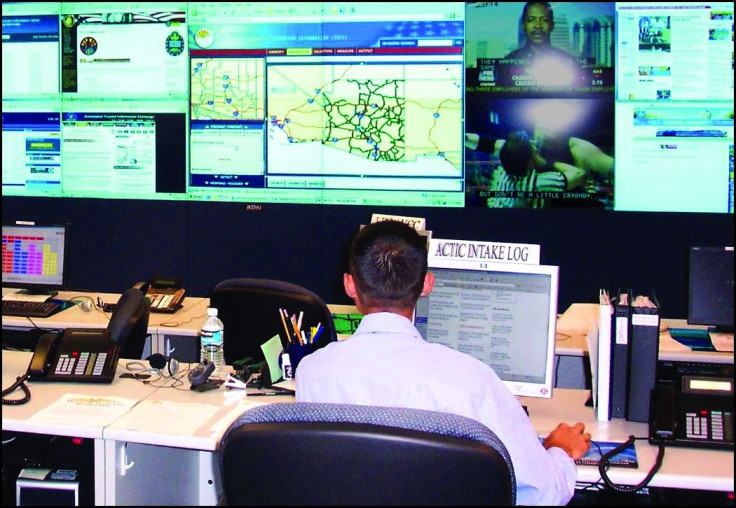Suspected Chinese Spy, Lizhong Fan, Fled US After Stealing Secrets From Arizona Counterterror Center: Report

A Chinese national who worked for an Arizona counterterrorism center may have been a spy who stole a trove of sensitive American security information and then disappeared, according to a new report that comes amid escalating espionage between the U.S. and China.
Lizhong Fan, a Chinese citizen, was hired at Arizona’s Counter Terrorism Information Center in 2007 and was granted access to a massive amount of information, including Arizona’s driver’s license list, far-reaching police databases, and possibly even a roster of intelligence analysts and investigators working for the federal government. Though Fan was monitored through almost every moment of his day at the counterterrorism center, he was somehow able to wipe his computers clean and leave the building with two laptops and a number of hard drives -- and flee to China -- one day five months into his job.
His mysterious employ at the federal building, and lingering questions about whether officials have covered up their response, are the subject of an extensive investigation by ProPublica and the Center for Investigative Reporting published Tuesday.
Fan was officially an employee of Hummingbird Defense Systems, an Arizona company hired to construct a facial recognition system for the state. Fan had previously worked on facial recognition technology for the Chinese government and, with his status as an active Chinese citizen apparently ignored, hired by Hummingbird, although it’s unclear if his hire was approved by the Department of Homeland Security. Pro Publica also suggested that Fan was recommended to Hummingbird CEO Steve Greschner by Xunmei Li, whom the FBI now suspects of conducting espionage on China’s behalf.
Fan’s responsibilities essentially included moving terabytes of driver’s license data, arrest information, and criminal history documents into Arizona servers. He was also charged with editing facial recognition software so that agents could scour the database for a physical description.
“Fan had access to the center’s main network, according to three sources with firsthand knowledge of Fan’s work arrangements,” ProPublica reported. “From there he would have been able to see the directory of federal agents and state police working at the Arizona counterterrorism center…Thus, day after day, Fan enjoyed the rarest of access to confidential personal and investigative files.”
Officials maintained that Fan, due to his citizenship, was monitored throughout each day to the point where he was escorted to the bathroom. They have no answer, though, as to why he was allowed bring laptops home from work and how, after five months at the center, he was able to buy an airplane ticket to Beijing and never return to his position in the U.S. Fan reportedly emailed former co-workers intermittently, promising to return to the U.S. until 2010, when he ceased all contact, according to those close to the situation.
What happened next, according to ProPublica and the Center for Investigative Reporting, remains unclear. Neither the Maricopa County Sherriff’s Office, which endorsed Fan for the position, nor any federal officials brought the data breach to light in the four years between Fan’s disappearance and Tuesday’s report.
Along with showing how little oversight is implemented over sensitive situations, the lapse is alarming because news of it comes amid heightening tension between the U.S. and China. If Fan was indeed a spy, his case is similar to that of Greg Chung, a Chinese-American engineer at Boeing who in 2009 was the first American to be convicted by a jury of economic espionage after being found guilty of transmitting non-classified technical documents to the Chinese government.
The Chung case came after American prosecutors described Chi Mak, a Chinese-born engineer living in a California suburb, as the “perfect sleeper agent.” Mak, like Chung and now Fan, worked for a contractor that was responsible for sensitive government technology and described as a quiet, diligent worker who often brought his paperwork home with him.
“The cases are among at least a dozen investigations of Chinese espionage that have yielded criminal charges or guilty pleas in the past year,” the Washington Post reported in 2008. “Since 200, Immigration and customers Enforcement officials have launched more than 540 investigations of illegal technology exports to China.
“Recent prosecutions indicate that Chinese agents have infiltrated sensitive military programs pertaining to nuclear missiles, submarine propulsion technology, night-vision capabilities and fighter pilot training – all of which could help China modernize its programs while developing countermeasures against advanced weapons systems used by the United States,” the same Post article noted.
While Chinese officials have steadfastly denied any such crimes, often pointing to Edward Snowden’s National Security Agency revelations to call U.S. officials who point the finger hypocrites, the facial recognition technology Fan is accused of stealing would certainly fall under the high-tech developments the Chinese would be interested in.
All of which goes without mentioning the ongoing series of cyberattacks that have infected American computers. The most recent to come from China involved the loss of 4.5 million hospital records, although that infiltration only came after Chinese hackers targeted a number of obscure albeit crucial federal government agencies.
© Copyright IBTimes 2025. All rights reserved.





















